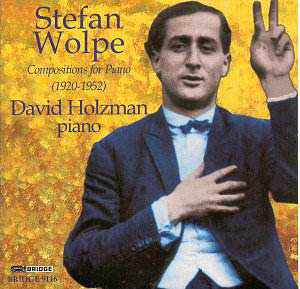The earliest pieces here were composed in the 1920s
when Wolpe was still in Germany and clearly reflect the Zeitgeist
of that period. The short Adagio "Because I must
leave something dear to me" was written in 1920 when Wolpe left
Weimar to return to Berlin. The slightly ironic Tango
(1927) is the sort of thing that Weill or Hindemith, to name but two,
could also have written then. The Piano Sonata No.1 "Stehende
Musik" ("Music of stasis") is somewhat more experimental,
i.e. from the formal point of view in that it emphasises repetition
rather than development. All three movements (a long slow movement framed
by two short quick explosive ones) are based on repetition: of rhythmic
phrases in the outer movements and of melodic lines in the central Fast
langsam. The First Piano Sonata is a considerable achievement, technically
and physically demanding, and of not inconsiderable strength.
The Zemach Suite (1939) was written for
the Russian dancer Benjamin Zemach and his dance group. As might be
expected, it is somewhat more accessible than the later pieces, though
– again – it is far from easy.
The more recent pieces were all written after Wolpe
settled in the States. During the war years, he planned a series of
Encouragements, the first number of which is the short
march The Good Spirit of a Right Cause (1942) which has
its share of dissonance and rugged energy, and which is totally devoid
of any jingoism. This and the second item Simple Music with Definitely
Political Intentions are reminiscent, so we are told, of anti-fascist
songs and marches written a decade earlier in Berlin. The third, and
by far the most complex and substantial, item was completed over the
period 1943-1947. Encouragements for Piano. First Piece. Battle
Piece had a somewhat chequered genesis. Wolpe put the work aside
after completing the fourth part. During the preparation of the first
performance of the completed sections in which Irma Wolpe and the then
young David Tudor were involved, Wolpe decided to complete the score
which was eventually first performed complete by David Tudor in 1950.
Later the movements were re-ordered and in 1958 Wolpe returned the work
to the original order and dedicated it to David Tudor. This is a quite
substantial score, terribly exacting from the technical point of view
and calling for enormous physical strength on the player’s part. This
uncompromising, sometimes unremitting music is constantly tense and
muscular though slower episodes allow for some fresh air into the music’s
dense and restless textures. I still do not know whether I like this
piece or not; but it definitely is a major work that only yields its
secrets after many repeated hearings and – I am sure – after many long
hours of close examination.
The short Waltz for Merle (1952) included
in this selection is only the ghost of a waltz, and a rather enigmatic
miniature.
Wolpe’s music is no easy stuff indeed. As already mentioned,
it calls for considerable strength on the pianist’s part, and also –
more importantly, I think – much conviction. David Holzman has both
and his committed readings of these demanding pieces are clearly the
result of a painstaking and thorough immersion in Wolpe’s intricate
music. A very fine release, indeed, but not an easy nut to crack.
Hubert Culot


